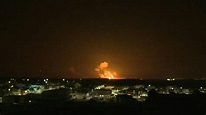Featured
article
- Get link
- X
- Other Apps
Trump's Public Disagreement with Intelligence Chief on Iran Raises Eyebrows

In a rare public rebuke, former President Donald Trump contradicted his own Director of National Intelligence over the assessment of Iran's nuclear ambitions. The moment, which sparked significant attention, unfolded after intelligence officials testified before Congress, suggesting that Iran was not actively pursuing a nuclear weapon at that time—a conclusion grounded in the intelligence community's most recent findings.
Trump dismissed this view, asserting that Iran remained a significant threat and that his administration's pressure campaign, including sanctions and withdrawal from the 2015 nuclear deal, was justified.
"I disagree with certain aspects of the intelligence community’s assessment," Trump said during a press interaction. "They’re wrong when it comes to Iran and their nuclear intentions."
This public split between the president and top intelligence officials sparked concern among policymakers and analysts, who viewed it as a potential sign of disconnect between the White House and its national security apparatus. Critics argued it undermined the credibility of the intelligence community, while supporters claimed it reflected Trump’s unfiltered style and determination to follow his own instincts on foreign policy.
Popular Posts
Trump's Six Words: "I'm Going to Stop the Wars"
- Get link
- X
- Other Apps
Midnight Blast Shakes Gaza Skyline Amid Rising Tensions
- Get link
- X
- Other Apps



Comments
Post a Comment